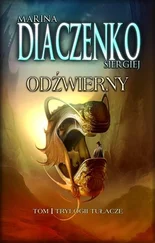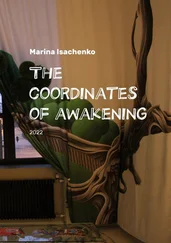The stray dog with the thin sides compassionately watched them from a gateway as they stumbled away.
* * *
Several hours later Toria came down with a fever.
Her bed seemed hot to her, like a tin roof glowing red from the sun. Egert was allowed in her small room for the first time. He sat on the edge of the bed and held her hand in his. Without saying a single word, the dean brought in a flask of smoking, sharp-smelling potion and placed it on the side table.
Toria was lying on her back. The white pillow disappeared beneath piles of her disheveled locks, and the haggard face of his daughter, blemished by a sickly flush, again struck Luayan with the similarity it shared with a long-dead woman.
Back when he was traveling about the world, he had stopped once for a night’s lodging in a small snow-covered village. The goodwife who gave him shelter did not know any more than that he was a mage. She informed him of a misfortune: Next door the daughter of the town elder, an unearthly beauty, was dying of an unknown ailment. Then he saw his future wife for the first time. Her head wallowed in the pillow in just the same way, her black hair snaked out over the white linens, and her face, haggard and feverish, already held the seal of her approaching death.
He cured her and left the house. Sudden happiness followed like a whirlpool in a calm and sleepy river, then the fear of losing everything, then happiness again: the birth of his daughter. Then there were five painful years, years that tossed Luayan from fever to chill, that taught him to forgive despite his pride: terrible years; his best years. He remembered them with a shudder, and would have given anything in the world to go back and live them again.
It is unlikely that she was meant to have a long life. One day, already saved by Luayan once, she passionately went out in search of her own death and found it, leaving him as mementos an unceasing sense of his own guilt and the young Toria.
Toria turned her heavy head, and her father looked into her eyes. Instantly, the dean shifted his gaze to Egert; Egert winced and thought the dean wanted him to release Toria’s hand, but he kept it pressed between his own.
Glorious Heaven, she resembles her mother too much. She is too like her mother to be happy. When he had given his blessing to her marriage with Dinar, he at least had known what it would entail: solace and security; friendly affection and shared labor in the ancient walls of the university would have firmly united his daughter and his favorite pupil. Egert had put an end to these hopes, and here Egert sat, on the edge of her bed, tormented by the gaze of the dean, realizing that he should leave, but unable to release her hand. Luayan could clearly see how well Toria’s palm nestled in his.
In his life there was nothing more precious than his daughter.
Two years ago her engagement had seemed to him a natural, inevitable part of a tranquil, measured life, but today a vague shadow hovered over the city, over the university, over these two who now held each other by the hand. Even though he was a mage, he could not determine what this threat was, but its presence could be felt more distinctly with each passing day. How should a person act today, if he did not know what might happen to him tomorrow?
Egert sighed brokenly. From the corner of his eye, Luayan saw how he tried to count her pulse, how he worried over her, how he was annoyed at him, Luayan, for his apparent inaction: If he truly were a mage, why didn’t he use his magic to cure her?
Egert was marked. He would bring misfortune to all who had the imprudence to be near him. So the Wanderer judged. But who knows what the Wanderer is or what would happen if his curse were reversed?
Toria stirred. The dean once again looked into her eyes, and it seemed to him that her eyelids lowered by a hair, as if Toria wished to nod to him.
The dean hesitated then nodded to her in answer. He delayed for a second, once more sweeping his gaze over Egert, who was enshrouded in silence, and then he stepped out of the room, firmly closing the door behind him.
The two who remained were silent for a long time. An expiring log crackled, softly and delicately, in the fireplace.
Finally, Toria smiled with obvious effort. “Your shirt is too small.”
Egert had borrowed the shirt from Fox because his own clothing was in need of washing. Gaetan’s shirt threatened to rip with every movement Egert made. His hair, freshly washed and not yet fully dry, seemed darker than usual. The light from the fireplace gleamed directly behind his back, and Toria’s burning fever created the illusion that Egert had bronzed shoulders.
Bending over her, he repeated the same questions several times; concentrating, she finally understood. “How can I help you? What do you need me to do?”
Even after they returned from the dank, raw night, she could not stop crying for a long time. She had radiated tears; she had drowned in their salty water like a dying sailor in the bosom of the sea. Egert, who had experienced a far greater shock that evening, held up better. He carried the shivering Toria for the last block before the university: her legs failed her and no longer desired to work. In her whole life only her father had ever carried her, and only in her remote childhood. She quieted and went limp, not helping Egert support her weight, but he stepped lightly as if he really were carrying a child or a small animal, as light as a feather, that had come to grief.
As he carried her, he felt each strained nerve, each quivering muscle, the beating of her heart, her fatigue and her distress. Then he pressed her more firmly to himself; he wanted to enfold her, to swath her in his own tenderness, to shelter, to warm, to protect.
The encounter with the dean, of which he was so afraid, passed without a single word. Submitting to Luayan, Egert helped Toria get into bed; a wailing old serving woman already waited nearby. The dean intently examined the guilt-ridden, tense Egert, but he never opened his mouth.
An ember prowled about the coals in the fireplace. Toria smiled faintly. The worst was far, far behind her; her present health, feverish and weakened, did not oppress her. On the contrary, she wished to dwell forever in this burning cloud, relishing her own frailty, serenity, and security.
“Tor. What can I do to help?”
Egert’s concern and anxiety pleased her. But her father … her father was always aware of everything.
The potion prepared by the dean steamed on the bedside table.
“It’s not all that serious,” whispered Toria, softly squeezing Egert’s hand. “There’s nothing to worry about. The medicine will help.”
He withdrew for a second to stoke the fireplace. The light flared up more brightly, and it seemed to Toria that Egert was now surrounded by copper tongues.
Laboriously, she sat up in her bed, holding the coverlet to her chest. “Give me the flask.”
Scooping the potion from his hands, she kneaded it into her temples for quite a long time. Soon she no longer had the strength to continue, but she did not think to summon the elderly nurse. Seeing that she was wearied, Egert offered yet again to help. Cautiously, overcoming his clumsiness, he proceeded to rub the ointment into the skin of her face and neck. The medicine smelled even more strong and bitter than wormwood warmed by the sun.
Her fever fell almost instantaneously, but instead of relief she again felt grief, and covered in sweat, she at first gave a short sob, then losing control over herself, she commenced to shake violently as tears streamed down her face.
Egert was at a loss. He considered running for the dean, but he could not release her quaking, moist hands. Egert leaned over the invalid, and his dry lips found first one tear-filled eye and then the other. Savoring the bitter taste in his mouth, he smoothed her disheveled, dark hair and drew his cheek against her cheek, scraping his scar along her skin. “Tor, look at me. Don’t cry.”
Читать дальше












